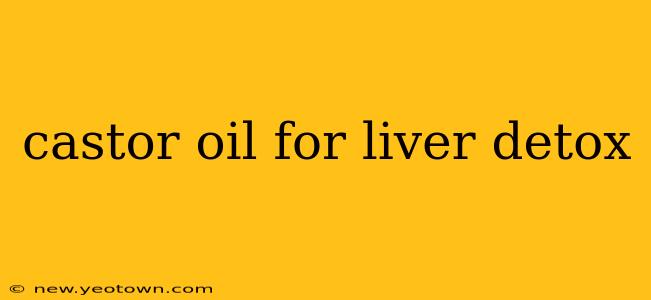The human liver, a tireless workhorse, filters toxins from our blood, metabolizes medications, and produces essential proteins. It's no wonder that the idea of a "liver detox" is so appealing, promising a refreshed, healthier organ. Castor oil, a thick, viscous oil extracted from castor beans, has gained popularity as a purported liver detoxifier. But does the science back up the hype? Let's explore the truth behind castor oil and its role (or lack thereof) in liver health.
My journey into researching castor oil and liver detoxification began with a simple question: Could something so readily available truly cleanse such a vital organ? The answer, I found, is far more nuanced than a simple yes or no.
Does Castor Oil Cleanse the Liver?
This is the million-dollar question, and unfortunately, the answer is a resounding no. There's no credible scientific evidence supporting the claim that castor oil directly cleanses or detoxifies the liver. The liver possesses its own highly efficient detoxification system; it doesn't need external assistance from castor oil or similar remedies. While castor oil has laxative properties, prompting bowel movements, this doesn't equate to liver detoxification. The liver and the bowels, while interconnected in the overall process of waste elimination, operate independently.
How Does the Liver Detoxify Naturally?
The liver's detoxification process is a complex biochemical dance involving multiple phases. It involves breaking down harmful substances, transforming them into less toxic compounds, and then excreting them through bile or urine. This intricate process is incredibly efficient and doesn't require external intervention like castor oil.
What are the Benefits of Castor Oil?
While castor oil doesn't detoxify the liver, it does have some recognized uses. Its primary benefit is its potent laxative effect, which can provide relief from constipation. It's also sometimes used topically for skin conditions and hair growth stimulation, although scientific evidence supporting these applications is limited.
Is Castor Oil Safe for Liver Health?
While castor oil itself isn't directly harmful to the liver, excessive consumption can lead to digestive issues such as diarrhea, nausea, and abdominal cramps. Therefore, it's crucial to use castor oil with caution and only as directed. Consult a healthcare professional before using castor oil, especially if you have underlying health conditions.
Can Castor Oil Cause Liver Damage?
While not directly causing liver damage, excessive or prolonged use of castor oil can indirectly impact liver function. Severe diarrhea caused by excessive castor oil consumption can lead to dehydration and electrolyte imbalances, which can indirectly strain the liver.
What are the Best Ways to Support Liver Health?
Instead of relying on unproven methods like castor oil for liver detoxification, focus on supporting liver health through proven methods:
- Maintain a Healthy Diet: A balanced diet rich in fruits, vegetables, and whole grains provides the nutrients necessary for optimal liver function. Limit processed foods, excessive sugar, and unhealthy fats.
- Stay Hydrated: Adequate water intake is crucial for flushing out toxins and supporting liver function.
- Exercise Regularly: Physical activity improves overall health, including liver function.
- Manage Your Weight: Obesity can strain the liver. Maintaining a healthy weight reduces this burden.
- Limit Alcohol Consumption: Excessive alcohol consumption is a major cause of liver damage.
Conclusion
The idea of a magic bullet for liver detoxification is alluring, but the reality is far more nuanced. Castor oil, despite its purported benefits, lacks scientific evidence supporting its role in liver cleansing. Prioritize a healthy lifestyle, including a balanced diet, regular exercise, and moderate alcohol consumption, to support your liver's natural detoxification process. If you have concerns about your liver health, always consult a healthcare professional for personalized advice. They can offer tailored recommendations and address any underlying health issues. Remember, your liver is a powerful organ; let's support it through sensible choices, not unsubstantiated claims.

